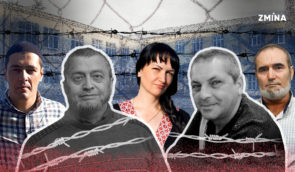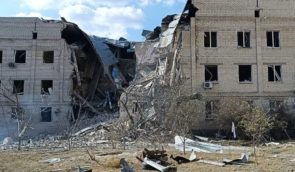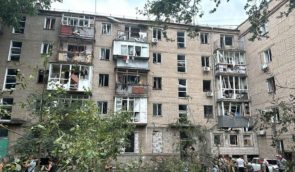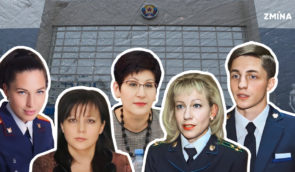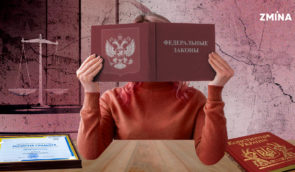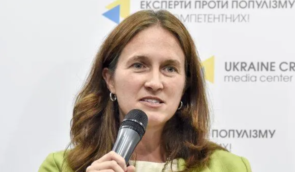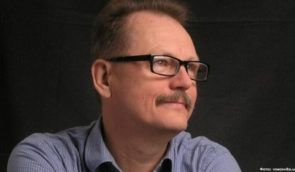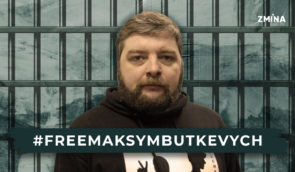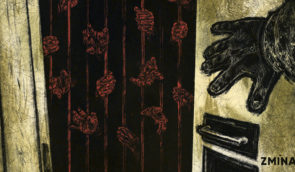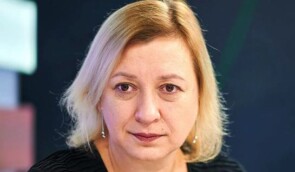OSCE’s Moscow Mechanism will help Ukraine show the true scale of war crimes committed against civilians by Russia in Ukraine
In Vienna on February 29, during a meeting of the Permanent Council of the Organization for Security and Co-operation in Europe (OSCE), 45 countries supported the launch of the Moscow Mechanism, which will allow gathering information about war crimes committed by Russians in Ukraine.
This is stated in a message on the OSCE website.
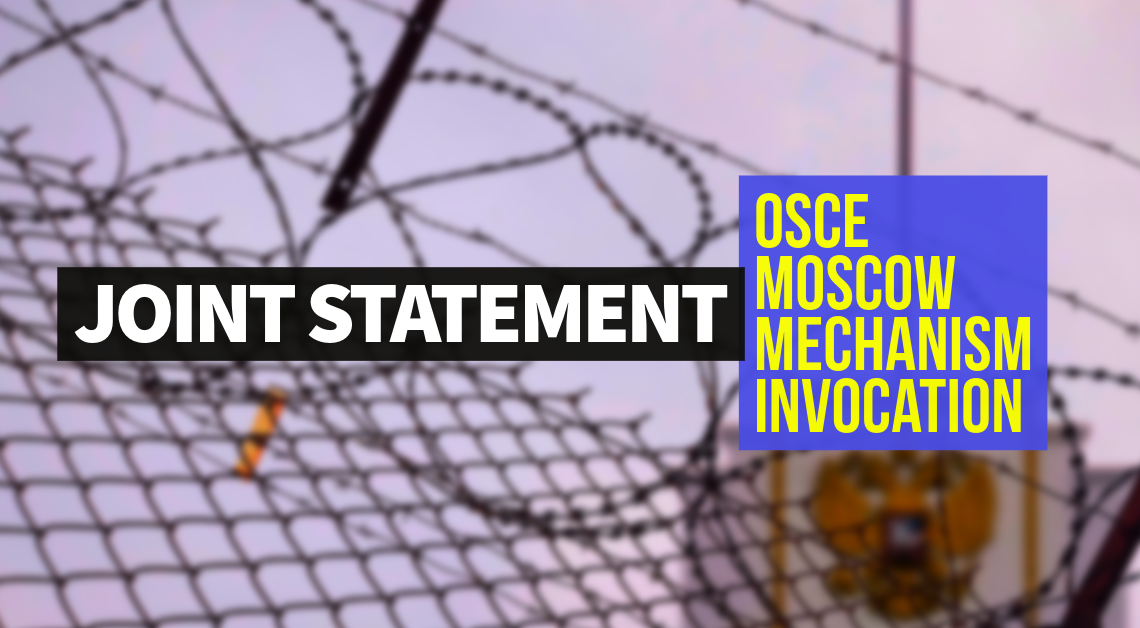
The “Moscow Mechanism” is a procedure developed by the OSCE that allows for the creation of an independent international mission whose task will be to study information on human rights violations, war crimes, and crimes against humanity, in particular against civilians and civilian infrastructure.
The Permanent Representative of Luxembourg to the OSCE, Jean Graff, speaking at the meeting of the Permanent Council of the OSCE, said:
“Today, our delegations, with the support of Ukraine, will send a letter to the director of the ODIHR [The Office for Democratic Institutions and Human Rights], Matteo Mecacci, which will refer to the involvement of the Moscow Mechanism. We are concerned that Russia continues to violate international humanitarian law and human rights during its war of aggression against Ukraine. In particular, we are extremely concerned about the arbitrary detention of Ukrainian civilians.”
Graff reminded that on February 24, 2022, the Russian Federation, with the support of Belarus, launched a full-scale aggressive war against Ukraine. This invasion was the culmination of Russia’s aggression against Ukraine, which continued since 2014 and violated its sovereignty, independence, and territorial integrity.
According to the Permanent Representative of Luxembourg to the OSCE, after bilateral consultations with Ukraine, members of 45 OSCE delegations decided to apply the 8th paragraph of the Moscow Mechanism. This was the result of the reports they received from independent experts, which included Russia’s violation of human rights and international humanitarian law in Ukraine.
Graff emphasized that the aggressor country has been violating international humanitarian law in occupied Crimea for the past 11 years. According to him, some shocking reports about the persecution of people in Crimea can be equated to the most severe international crimes:
“From several sources, including expert missions of the Moscow Mechanism, ODIHR, the United Nations, and public organizations, we learned that the Russian Federation is arbitrarily detaining a large number of civilians in the temporarily occupied territories. According to their data, Ukrainian civilians became victims of abductions and other forms of deprivation of liberty, including cases of enforced disappearance. Many remain in custody or are considered missing because their whereabouts are unknown.”
Jean Graff reminded that Russia has been illegally detaining three employees of the OSCE Special Monitoring Mission for about 700 days, despite repeated calls for their release.
As the Permanent Representative of Luxembourg to the OSCE noted, Ukrainian civilians are detained in the territories occupied by Russia and kept “in improvised and unofficial places of deprivation of liberty.” Then, they are transported to other places of detention in the temporarily occupied territories of Ukraine or deported to the Russian Federation. In many cases, civilians are held incommunicado. For the most part, the Russians detain representatives of Ukrainian local authorities, volunteers, human rights defenders, journalists, representatives of the clergy, teachers, activists, and ordinary citizens.
“In most cases, civilians are detained without any explanation and without providing their relatives with information about their whereabouts. Because of this, it is difficult to establish their whereabouts and the status of persons in custody,” Jean Graff added.
According to the testimony of the victims and the witnesses they provided to the OSCE, Russia’s actions against civilian detainees demonstrate a complete disregard for human dignity. The Russians also torture them, use sexual violence against them, and oppress them. Lawyers are not allowed to visit Ukrainians, and representatives of the International Committee of the Red Cross are not allowed to see them. Witnesses also describe appalling conditions of detention for civilians, including overcrowded cells, lack of medical care, and inadequate and unsanitary conditions.
“We are deeply concerned about the seriousness and number of these violations. We are particularly concerned about reports of extrajudicial executions of civilians in Russian custody,” Jean Graff said.
He called on the director of the OSCE’s Office for Democratic Institutions and Human Rights, Matteo Mecacci, to appeal to Ukraine with a proposal to send a group of international experts to investigate the crimes committed by Russia against Ukrainian citizens. The information they collect will be transferred to national, regional, or international courts or tribunals.
Earlier, several Ukrainian human rights organizations called for the launch of the Moscow Mechanism. Among them, it is worth mentioning the Media Initiative for Human Rights, which, together with the “Ukraine 5 AM” Coalition and Ukrainian diplomats, advocated this initiative for a year and a half. The Media Initiative for Human Rights held about ten special events in the OSCE, during which its representatives told the participants about mass filtering, women in captivity, arbitrary detention, and torture of civilians. The organization believes the upcoming OSCE report ”will become an essential tool for documenting and proving Russia’s crimes at the international level.”
“We are waiting for independent experts in Kyiv who will work on a report on violations of the Russian Federation – arbitrary deprivation of liberty of civilians. The report will appear already in April”, Tetiana Katrychenko, Executive Director of Media Initiative for Human Rights, wrote on Facebook.
According to Nataliia Okhotnikova, a Human Rights Advisor at Human Rights Centre ZMINA (ZMINA), this is a powerful signal for the creation of a mechanism for the release of civilian hostages in the future. In this way, it will be possible to draw the attention of the international community to the crimes committed by the Russian Federation in the occupied territories. In the future, all collected data on forced abductions can be used in international courts to bring the Russians to justice.
“Human Rights Centre ZMINA will need this mechanism to strengthen our position regarding civilian hostages. We have to recognize the fact that international organizations are listening more to international missions and groups. And the fact that the OSCE will come to Kyiv and gather information about civilian hostages is a good signal. The importance of this report will lie in the fact that it will be written by an impartial third party and not by Ukrainian NGOs”, the expert believes.
She added that the launch of the Moscow Mechanism would allow “substantiation of individual cases of arbitrary abductions documented by Human Rights Centre ZMINA.” In the future, thanks to this, it will be possible to prove the scale and systematic nature of these crimes. Perhaps later, the actual numbers of Ukrainian civilians abducted by the Russians will appear.
According to Tetiana Zhukova, ZMINA’s International Advocacy Officer, the Moscow Mechanism will allow international experts who will process information documented by Ukrainian public organizations to add it to their report. This international document verifies the crimes that Russia commits in the temporarily occupied territories.
“The Moscow Mechanism is an objective international confirmation that Ukrainians are constantly abducted or detained on the territory of Ukraine occupied by Russia. And these are not our inventions. We all know very well how the Russians after we provide evidence of their crimes, deny everything. They often say that this is all a lie, that nothing like this is happening, and all this is allegedly done by the Ukrainians themselves”, the human rights defender says.
Human Rights Centre ZMINA also joined the advocacy for introducing the Moscow Mechanism by highlighting this topic during bilateral meetings with foreign diplomats in the OSCE. The organization also took an active part in the event on political prisoners during the OSCE Warsaw Human Dimension Conference, where it also discussed the topic of the abduction of civilians in the newly occupied territories.
At the end of April last year, ZMINA, together with Media Initiative for Human Rights, the World Organization Against Torture, and the Human Rights House Foundation, held a special event on the topic “Tortures in the occupied territories of Ukraine as crimes against humanity and war crimes: analysis and survivors’ testimonies.”
According to Yelyzaveta Sokurenko, ZMINA’s Head of the War Crimes Documentation Department, ZMINA conducted 57 in-depth interviews with victims and witnesses of torture. The organization also documented over 400 reports of such cases from open sources.
Earlier, Human Rights Centre ZMINA, in cooperation with the Media Initiative for Human Rights and the World Organization Against Torture, submitted a joint report to the Universal Periodic Review of Russia. Its topic, “Torture and other forms of ill-treatment committed in the context of armed conflict by the representatives of the Russian Federation in the territory of Ukraine,” was thoroughly analyzed and researched within the framework of the activities of organizations documenting torture and enforced disappearances in particular within the framework of Ukraine 5 AM Coalition.
Ukraine 5 AM Coalition includes 34 public organizations that work together to protect the victims of Russian armed aggression in Ukraine and bring to justice the top leadership of the Russian Federation and the direct perpetrators of crimes. Organizations transfer documented information to the Prosecutor General’s Office of Ukraine, national investigative bodies, the UN Special Rapporteur on torture, the UN Human Rights Monitoring Mission in Ukraine, the Independent International Commission of Inquiry on Ukraine, the International Criminal Court, experts of the OSCE Moscow Mechanism and other bodies.

